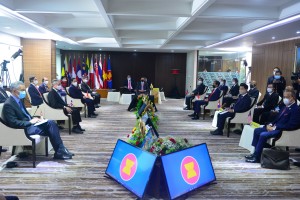
In Focus: ASEAN Summit
 By Venkatesh Raghavan
By Venkatesh Raghavan
The Association of South East Asian Nations, ASEAN, that comprises 10 neighbouring countries, had to depart from its conventional stand of non-interference in view of the pressing international demand to rescue the military ruled state of Myanmar from the throes of a civil conflict.
The February 1, 2021 military coup led by General Min Aung Hliang that usurped power from a democratically elected government in Myanmar has resulted in over 700 deaths and more than thousands of civilians being imprisoned for their proactive uprising against the military rule. The crisis situation viewed by the international community has precipitated a loud outcry and furore over the blatant violation of human rights.
The international body, UN which keeps an eye on global developments feels that the ASEAN bloc is the most suited multilateral body to tackle the situation and attempt restoration of normalcy in the strife torn military state. Taking cue from the UN general Secretary’s observations, the 10 nation regional body made a concerted effort to arrive at a consensus solution that can help resolve the unabated frenzy of violence unleashed on a hapless civilian population.
Interestingly, the military dictator Hliang too participated in the deliberations – the first time since the coup that he travelled outside Myanmar. He arrived in Jakarta on April 24. His attendance at ASEAN gave rise to suspicion on whether that meant endorsement of his rule. There were some indications from the junta in Myanmar that they were considering recommendations from ASEAN even when fighting is spilled over into Thailand. At the United Nations, the Secretary-General’s office too conceded that the UN Chief’s special envoy too would “continue to engage with all the different stakeholders in Myanmar, including with the Tatmadaw”. In Jakarata, the envoy did meet with a number of different foreign ministers of ASEAN nations on the margins of the summit. However, it said at this point of the diplomatic process, the Secretariat would not provide “a lot of details”. Farhan Haq, Deputy Spokesman for the Secretary-General, told media persons on April 28, that “the nature of the diplomatic process is that sometimes we need to give our diplomats on the ground the space to conduct their work, and that is what we will be doing”.
Till the penultimate day, the 10-nation summit reached unanimity on an immediate cessation of all violence. The summit delegates were of the opinion that once the violence abates, a platform should be made available for peaceful negotiations. They opined that a special envoy can be then deployed to play a mediatory role in the negotiations. They also sought to provide all humanitarian assistance to the civilian masses of Myanmar.
Finally, the summit participants also expressed unanimity on allowing the UN appointed special envoy to visit Myanmar and hold talks with all the stakeholders in the country. At this point of time, though it seems unlikely to reach such a logical end, though talks about bringing violence to a halt is the major focal point of all the participating delegates in the summit.
Despite the consensus being reached, on ground, there seems to be little likelihood of any let down on the violence unleashed by the militia owing to the one-sided nature of clashes, with unarmed civilians getting gunned down
There are also reports streaming in about the continued bombing of villages occupied by ethnic minorities of Myanmar. As these killings get underway much is going to depend on how effective international pressure acts to thwart the designs of the military dictator Hliang.




